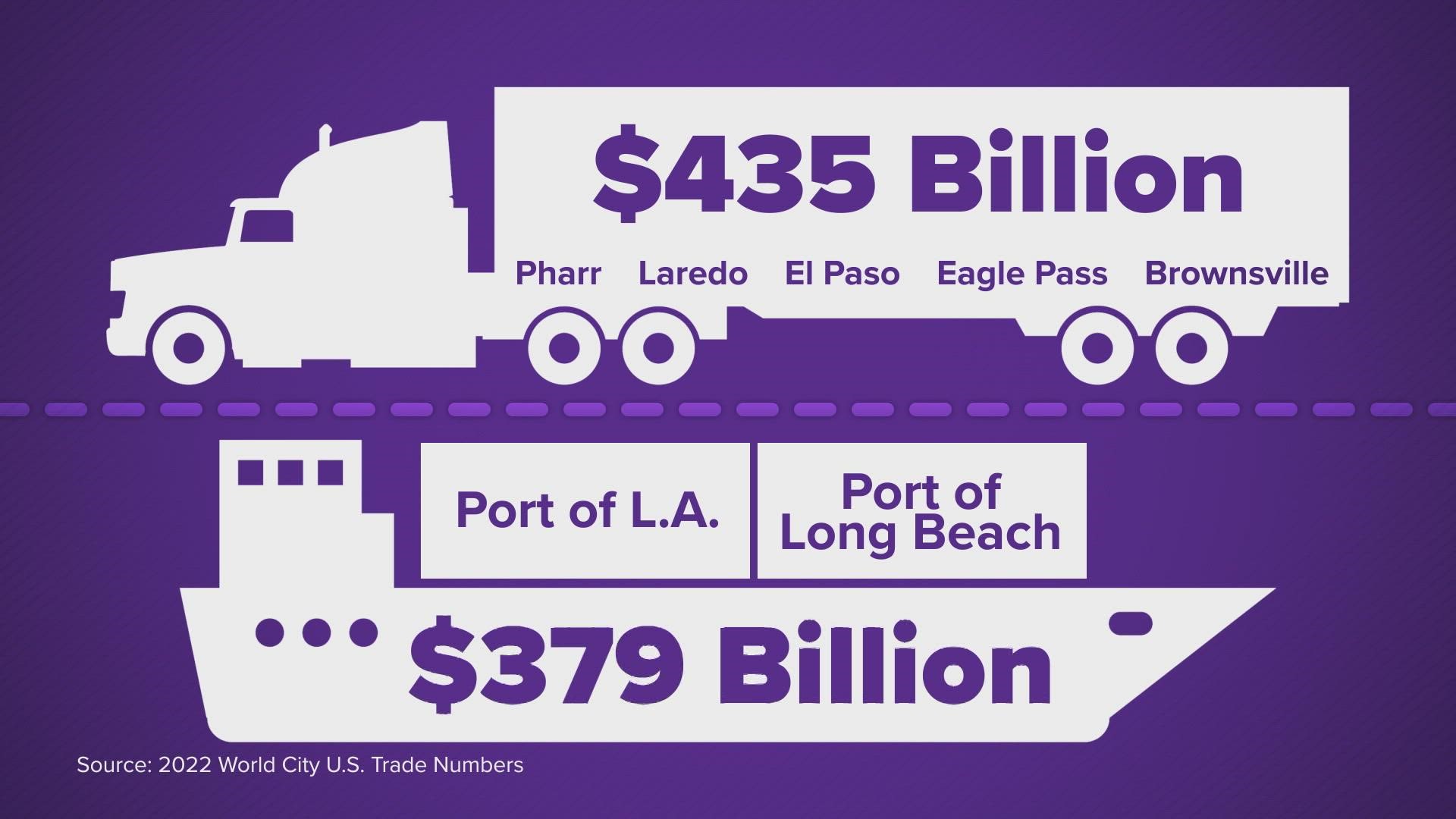DALLAS — We've had the pandemic and ongoing COVID-19 lockdowns around the world.
We've also had the Russian invasion of Ukraine and the sanctions that followed. And we've had global shipping chaos for various reasons.
Those huge disruptions have broken supply chains and have helped cause prices to rise.
So, we have been seeing more "nearshoring," which is when production moves to a closer country -- like Mexico -- and those products get into the U.S. through a border state, like Texas. One of several hotspots for that cross-border traffic into Texas is the Pharr International Bridge near McAllen.
City of Pharr Bridge Director Luis Bazan says, "On a day-to-day basis we are crossing 2,700 to 2,800 trucks -- just northbound."
Bazan says they process almost as many trucks headed south into Mexico. And the city is in the process of implementing a plan to double the size of that bridge, so that in the years ahead they can handle double the truck traffic that comes through that crossing today.
Bazan says, “There’s roughly 450-plus airports, seaports, and land ports. We’re actually between 29th and 30th (in trade value). We are fluctuating between 29th and 30th position.”
And Pharr isn’t even the largest of the land ports in Texas. It’s not even the second largest.
In fact, if you combine the bridge at Pharr with the crossings in Laredo, El Paso, Eagle Pass and Brownsville, you get total trade of $435 billion last year, according to the 2022 World City U.S. Trade Numbers. That’s more than the combined total of the legendary seaports of Los Angeles and Long Beach, which the ranking showed handled $401 billion in trade.
At the Pharr bridge, Bazan says that from January through August of this year, “We are seeing a 30% uptick compared to the same time period last year…and that is just the gross, continuous movement of traffic. There’s just more demand.”
The free trade zone through North America is also a relatively simpler haul, less prone to global shipping problems and COVID lockdowns. And it offers access to perhaps the most lucrative market in the world.
After the North American Free Trade Agreement, or NAFTA, was replaced by a free trade agreement called the USMCA, the U.S.-Mexico-Canada Agreement, locals say you might as well add in some extra letters in USMCA, particularly another "C." That's because they say Chinese companies have increasingly been making and assembling a ton of products in Mexico to send to the U.S.
By making the product in Mexico and making sure it is marked 'Made in Mexico,' they can take advantage of USMCA duty free and they can also get the Chinese tariffs, the Section 301 tariffs waived, too, says Interlink Trade Services President Jorge Torres.
Chinese firms have reportedly been especially aggressive investing in trade companies on the Mexican side of the border, but they certainly are not alone. Companies from other countries who covet the huge U.S. market have done the same.
These days, they and everybody else hoping to sell in America are trying to untangle the pandemic supply chain snarl by producing as much as they can. But as the economy slows, products and raw materials are piling up here in a way Torres hasn’t seen before.
“It just sits here…then you run out of warehouse space.” Torres, who oversees about 300,000 square feet of warehouses in the Rio Grande Valley, has had to create extra holding space in tractor trailers in the parking lot, "Yeah there are trucks outside with some material in them."
Torres says the region desperately needs more storage to keep up as supply of some items starts to stack up now that companies have gone from a "just in time" pre-pandemic approach to stocking to a "just in case" footing that has become a hallmark of pandemic business uncertainty.
Both Bazan and Torres say it is appropriate that the two Texas gubernatorial candidates will be facing off in their first debate here in the Rio Grande Valley. Bazan says, "We always want our politicians to visit our border."
Torres says border security and immigration are important issues, but he expects the two men to also discuss border trade, which has become an enormous economic engine for the state of Texas.
And maybe the political spotlight might make that fact clear to ordinary Texans, too. Torres is confident that something most Texans eat or use on any given day passed across the Texas-Mexico frontier… in fact, it may have sat for a time in one of his sprawling warehouses.

